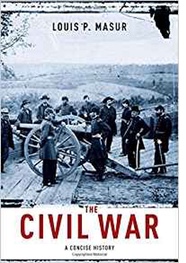Donald Trump Is a Civil War Revisionist
Often overlooked in the brouhaha about Donald Trump’s comments on Andrew Jackson and the Civil War is the revisionist perspective that he offers. The President suggested that Andrew Jackson would have prevented the Civil War and the conflict could have been avoided. “Had Andrew Jackson been a little later,” said the President, “you wouldn’t have had the Civil War.”
 Such
a view claiming that the war was avoidable is not mere innocent
counterfactual speculation. It is a view that dates back to the
aftermath of World War I, when historians questioned the conflict’s
inevitability. Scholars such as Avery O. Craven, Charles W. Ramsdell,
and James G. Randall saw the Civil War as a tragedy that might have
been prevented. They blamed it on a breakdown in democracy and the
actions of fanatical abolitionists. They portrayed slavery as a
benign but unprofitable institution and assumed it would have died
out, probably in the near future. According to them, the war was
irrational, needless, brought on by a “blundering generation.”
This interpretation of the war came to be known as “revisionist,”
revising the nationalist perspective that viewed the war as justly
fought to save the union and abolish slavery.
Such
a view claiming that the war was avoidable is not mere innocent
counterfactual speculation. It is a view that dates back to the
aftermath of World War I, when historians questioned the conflict’s
inevitability. Scholars such as Avery O. Craven, Charles W. Ramsdell,
and James G. Randall saw the Civil War as a tragedy that might have
been prevented. They blamed it on a breakdown in democracy and the
actions of fanatical abolitionists. They portrayed slavery as a
benign but unprofitable institution and assumed it would have died
out, probably in the near future. According to them, the war was
irrational, needless, brought on by a “blundering generation.”
This interpretation of the war came to be known as “revisionist,”
revising the nationalist perspective that viewed the war as justly
fought to save the union and abolish slavery.
In the aftermath of World War II and during the Civil Rights movement, the idea of the Civil War as necessary and principled regained a foothold, but Civil War revisionism was never far below the surface and it has returned with a vengeance as debates over the Confederate flag and expressions of white supremacy fill the news. The implications are that the Confederate cause was noble, that emancipation turned into a northern rampage against southern society, and that political gimmicks, not moral principles, motivated leaders such as Abraham Lincoln. Few, if any professional historians have embraced this view, which is largely championed by right-wing polemicists, neo-Confederate apologists, and some libertarians.
Lincoln too has been a subject of Trump’s comments. After asserting that most people did not realize Lincoln was a Republican, he called him a “great president.” Of course this is at odds with Trump’s belief that the war could have been avoided. Why was Lincoln unable to do what Trump believes Jackson could have done? Lincoln certainly tried. He reassured southerners that he had no intention of interfering with slavery where it existed (though he remained steadfast in opposing its expansion beyond the fifteen states where it existed). He supported a constitutional amendment that would have forever barred the federal government from abolishing slavery. He made it clear to the secessionists that the question of war rested in their hands, not his.
Lincoln also admired Jackson – both he and Trump hanged his portrait in their office. Lincoln did so because of Jackson’s commitment to the Union and his willingness to use force to prevent disunion. Trump has done so because Jackson was a populist, beloved by the people. Trump of course is wrong to say Jackson would have prevented the Civil War. If anything, he would have fired the first shot, despite his support for slavery. “Disunion by armed force is treason,” declared Jackson during the nullification crisis.
But Trump is more than happy to encourage states rights. Unfortunately, what this has historically meant was state use of local authority to subvert anti-discrimination laws and Supreme Court decisions, such as Brown v. Board of Education decision ruling segregation unconstitutional. Donald Trump has said he wants to make states “laboratories of democracy.” Maybe in recent years, with same-sex marriage and recreational marijuana laws, they have been just that. But not in the past, not when it came to civil and political rights. Donald Trump’s Attorney General praised the gutting of the Voting Rights Act by the Supreme Court as a victory for states rights, and has opposed consent decrees to reform police departments that had engaged in systematic patterns of discrimination.
It is not the states that have preserved American democracy. The very war that Trump believes could have been avoided was fought by the national government against states in defense of democracy. It galled Lincoln that in response to his election, seven states seceded. Southerners had other remedies for the election of an unpopular Republican president: preparing for the next election; working through Congress to reach a compromise; proposing constitutional changes. But destroying the country wasn’t one of them. Ballots, not bullets, were the answer to any democratic crisis.
But bullets were forced on the nation. The war, Lincoln said, was “a people’s contest,” a war fought to show for all time that “government of the people, by the people, for the people shall not perish from the earth.” The Civil War was fought to preserve the Union. It became a war to abolish slavery. It was a war in which the national government defeated a rebellion and defended democratic, constitutional authority. Despite its horrendous cost in human lives, the Civil War could not have been avoided and no amount of revisionist rhetoric should make us think otherwise.